
Writer’s Block brings lost voices to the DIA
Writer’s Block organizers introduce the afternoon’s readers.
During the Writer’s Block reading on the afternoon of Saturday, February 28th, the Diego Rivera courtyard was filled with “lost voices to be resurrected in the DIA.” The event featured the poetry of inmates from the Macomb Correctional Facility, as read by their family members or Writer’s Block facilitators before a packed crowd of attendees.
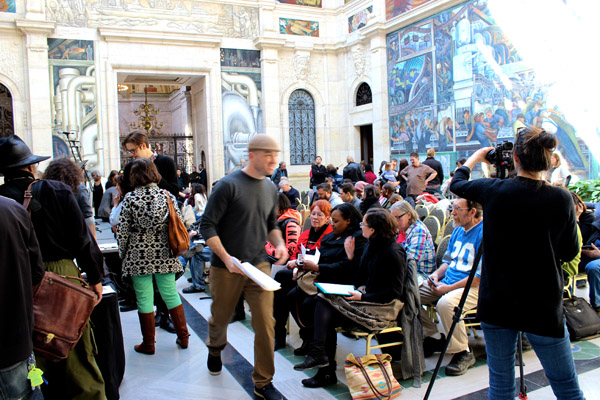
The courtyard was filled with people eager to hear from these incarcerated men, many of them juvenile lifers.
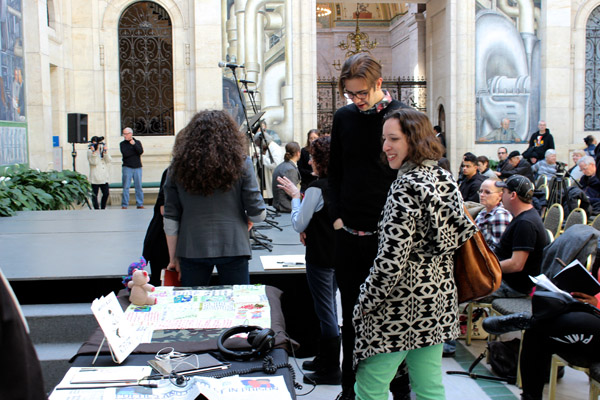
Reader Mike Lala (center) stands by the audio station where you could listen to the poets reading their own work.
The Writer’s Block is a poetry workshop at Macomb Correctional Facility that shares organizational overlap with the facilitators of the Hamtramck Free School, Jonathan Rajewski and Michael Brown. Facilitators and incarcerated artists have been collaborating over the last few years to compile various works of art to present to the public. On display during this event were audio recordings, Writer’s Block publications, and various works of art created by Writer’s Block artists and other incarcerated people over the last two years.

A piece of artwork by the multi-talented David Armstrong Jones.
The reading itself was a powerful experience, with a multitude of layers. There was the poetry itself, some of which candidly addressed the realities of a life sentence. One such work was “Lipstick on a Monster” by David Armstrong Jones; others included several poems consisting of litanies of instructions and regulations that are the first language of those who live in correctional facilities.
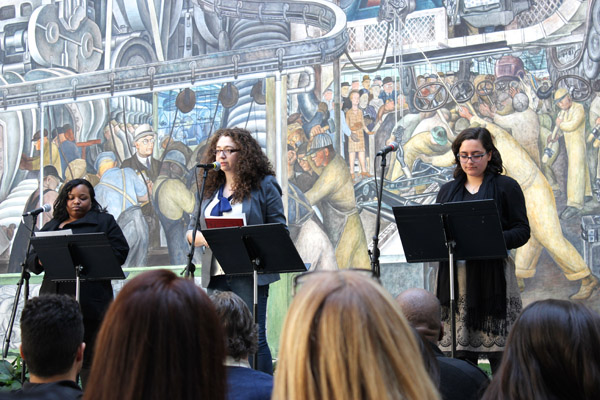
Mercedes Jones (left), Anna Kohn (center), and Aayat Ali (right), reading for David Armstrong Jones, James D. Thomas, and Maurice, respectively.
There was the question of representation. Of course, the poets were not able to be present to read their own work, although there was an opportunity to listen to recordings made by the poets reading their works in their own voices. The presence of family members who stood in to read for the inmates put a face to the real, human collateral damage to people who watch their fathers, cousin, brothers, sons and “loving nephews” spend their entire lives in prison. It seems reflexive to question the legitimacy of facilitators representing the experience of these prisoners; however, a number of the works that were read demonstrated poetry’s ability to capture another’s perspective. A poem called “She Wasn’t” by a man named Maurice visited the struggle of an unnamed Muslim woman for respect and recognition within her own community. Yusef Qualls-El’s “My Father’s Table,” powerfully read by his own father, Reverend J. Yusef Qualls, created a deeply imagistic racial history stretching back millennia.
Organizer Jonathan Rajewski emphasizes, “We encouraged the men to select their readers, and gave priority to family members and friends.”

Rev. Yusef J. Qualls (left) read for his son, Yusef Qualls-El; Lori Platt (center) for her cousin Jamie; and a man who introduced himself as Demetric a.k.a. Shabazz read for David Armstrong Jones, whom he said was a.k.a. ‘Go DJ.’
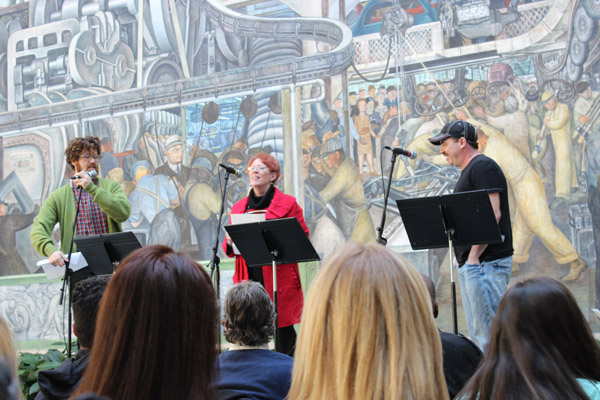
Judy (center), mother of David Armstrong Jones, read movingly on behalf of her son; facilitator Phreddy Wischusen (left) read for Steve Hibbler; and a man named Scott (right) read for his brother Jamie.
Ultimately, the event was moving, beautifully realized, and clearly cathartic for many of the audience members and readers. Outstanding recognition is due to the Hamtramck Free School, Writer’s Block organizers and volunteers, and the DIA. Most importantly, recognition is due to the poets, whose presence, at least for an afternoon, reverberated within a different kind of institution.
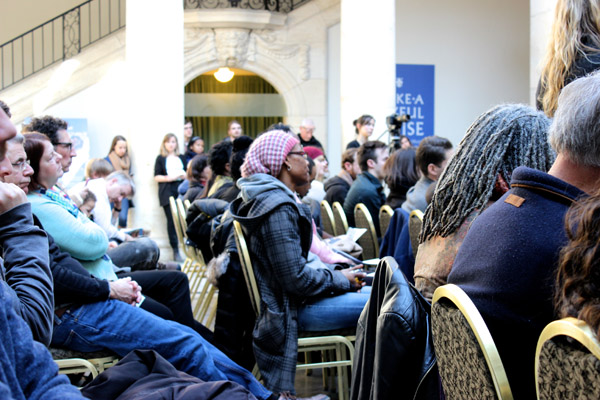
The crowd was solemn but focused on the readers with an intensity even beyond the norm for poetry readings.
To learn more about Writer’s Block and other Free School classes and volunteer opportunities, visit hamtramckfreeschool.org.
Recent Content
-
Artsarticle ·
-
Artsarticle ·
-
Artsarticle ·
